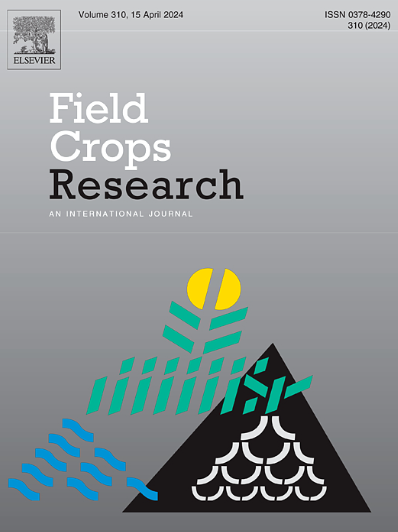Incorporating crop rotation into the winter wheat-summer maize system to enhance soil multifunctionality and sustainable grain production in the North China Plain
IF 5.6
1区 农林科学
Q1 AGRONOMY
引用次数: 0
Abstract
Context
The winter wheat-summer maize double cropping system has long been a dominant practice in the North China Plain. However, its continuous use has led to soil fertility decline, biodiversity losses, and nutrient imbalances, thus threatening grain production sustainability. Crop rotations are of great essential to enhance soil health and resilience, but its benefits for the winter wheat-summer maize system in this region remain poorly understood.
Objective
This study evaluates the effects of incorporating crop rotations into the winter wheat-summer maize system to mitigate soil degradation, enhance soil multifunctionality (SMF), and maintain high grain yield production.
Method
A field experiment (2018–2022) compared three crop rotation systems, spring sweet potato → winter wheat-summer maize (Psw-WM), spring peanut → winter wheat-summer maize (Pns-WM), and spring sorghum → winter wheat-summer maize (Sor-WM), against continuous wheat-maize cropping (WM-WM). The winter wheat and summer maize yields were assessed annually, and soil physicochemical properties, enzyme activities, and rhizosphere microbial communities were analyzed during the second crop cycle to assess SMF.
Results
Compared to WM-WM, the Pns-WM and Psw-WM significantly increased annual winter wheat and summer maize yields by 8.12 %–11.39 % and 8.78 %–15.82 %, respectively. Compared to WM-WM, these rotations (Pns-WM and Psw-WM) enhanced SMF by 1- to 2-fold due to increased soil organic carbon (SOC), improved enzyme activities, and better nutrient cycling. The lower pH and higher bacterial and fungal richness (e.g. ACE indices) were found in Pns-WM and Psw-WM, as compared to WM-WM. Furthermore, Pns-WM increased beneficial genus such as Penicillium and Fusarium while reducing pathogenic taxa like Alternaria. Partial least squares structural equation modeling illustrated that improved SOC, enzyme activities, and microbial diversity drove the increases in SMF and grain yield in the Pns-WM and Psw-WM.
Conclusion
Integrating peanut or sweet potato into the winter wheat-summer maize system effectively enhances soil health, SMF, and grain yield. Thus, introducing annual crops as preceding crops to the current WM-WM rotation is beneficial for fostering microbial diversity and enzyme activities, improving soil properties, enhancing grain yield, and providing a sustainable pathway for resilient food production in the NCP and similar agroecosystems.
冬小麦-夏玉米轮作系统对华北平原土壤多功能和粮食可持续生产的影响
在华北平原,冬小麦-夏玉米两熟制长期以来是主要的种植方式。然而,它的持续使用导致土壤肥力下降、生物多样性丧失和养分失衡,从而威胁到粮食生产的可持续性。作物轮作对提高土壤健康和恢复力至关重要,但其对该地区冬小麦-夏玉米系统的益处仍知之甚少。
本文章由计算机程序翻译,如有差异,请以英文原文为准。
求助全文
约1分钟内获得全文
求助全文
来源期刊

Field Crops Research
农林科学-农艺学
CiteScore
9.60
自引率
12.10%
发文量
307
审稿时长
46 days
期刊介绍:
Field Crops Research is an international journal publishing scientific articles on:
√ experimental and modelling research at field, farm and landscape levels
on temperate and tropical crops and cropping systems,
with a focus on crop ecology and physiology, agronomy, and plant genetics and breeding.
 求助内容:
求助内容: 应助结果提醒方式:
应助结果提醒方式:


